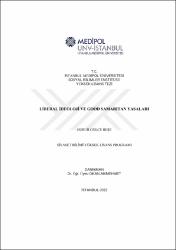| dc.contributor.advisor | Akmehmet, Okan | |
| dc.contributor.author | Beşe, Gurur Gülce | |
| dc.date.accessioned | 2023-11-30T07:40:33Z | |
| dc.date.available | 2023-11-30T07:40:33Z | |
| dc.date.issued | 2022 | en_US |
| dc.date.submitted | 2022 | |
| dc.identifier.citation | Beşe, G. G. (2022). Liberal ideoloji ve Good Samaritan yasaları. (Yayımlanmamış yüksek lisans tezi). İstanbul Medipol Üniversitesi Sosyal Bilimler Enstitüsü, İstanbul. | en_US |
| dc.identifier.uri | https://tez.yok.gov.tr/UlusalTezMerkezi/tezSorguSonucYeni.jsp | |
| dc.identifier.uri | https://hdl.handle.net/20.500.12511/11896 | |
| dc.description.abstract | Bu çalışma bireylerin yardım ve bildirim yükümlülüklerini tanımlayan Good Samaritan yasalarını liberalizm bakış açısından incelemektedir. Çalışmanın analitik düzlemdeki ana amacı etik, sosyolojik, hukuki ve siyasi açılardan sürekli değerlendirilmesi gerekli bir konu olarak Good Samaritan yasalarına temel oluşturan etik prensipler ile liberal etik prensipleri karşılaştırmaktır. Çalışmanın pratik düzlemdeki yan amacı Kadir Şeker kategorisindeki davalara ışık tutarak liberal etik düşünce için uygulamaya yönelik yeni alanlar açmaktır. Good Samaritan yasalarının teşvik edici veya zorlayıcı niteliğe sahip iki ana türü mevcuttur. Çalışmada birincil olarak mikro karşılaştırmalı hukuk yöntemi kullanılarak yasanın hangi hukuk sisteminde ne şekilde yer aldığı açıklanmıştır. Üç tür liberalizmi (klasik, modern ve liberteryen) temsil eden düşünürlerin eserleri birincil ve ikincil kaynaklar kullanılarak incelenmiştir. Son olarak Kadir Şeker davası dahil olmak üzere dört Good Samaritan vakası değerlendirilmiştir. Çalışmanın birinci hipotezi, Kıta Avrupası hukuk sisteminde yasanın Anglosakson hukuk sistemine nispeten katı sorumluluk ve cezadan oluşacağıdır. İkinci hipotez, klasik liberaller ve liberteryenlerin yasaya ilişkin olumsuz, modern liberallerin olumlu görüşte olacakları yönündedir. Çalışmada, klasik liberalizmi temsil eden düşünürlerden Locke, Smith, Hume, Mill, Bentham'ın teorilerinden hareketle yasayı onaylayabilecekleri, ancak Bastiat'ın reddedebileceği; modern liberalizmi temsil eden Rawls ve Freeman'ın teorilerinin yasayla örtüştüğü; liberteryenizmi temsil eden ve bu yasayı reddeden Rothbard bakış açısının aksine yine bir liberteryen olan Nozick'in düşüncelerinin yasayı destekleyeceği sonucuna ulaşılmıştır. Çalışmanın nihayetinde, hukuk sistemlerindeki yasanın durumuna ve liberal kırılımları temsil eden düşünürlerin yaklaşımlarına ilişkin hipotezleri destekleyici deliller sunulmuştur. Ancak klasik liberallere ilişkin hipotez desteklenmemektedir. | en_US |
| dc.description.abstract | This study examines Good Samaritan laws from the perspective of liberalism. Due to the dynamic nature of morals, Good Samaritan laws demand constant academic feedback from Sociology, Law, Political Science and other fields. At the analytical level, the main goal of the study is to compare liberal thought with ethical principles that form the basis of Good Samaritan laws. At the practical level, the secondary aim of this study is to open new fields of application for liberal ethical theory through shedding light on highly debated legal cases such as the case of Kadir Şeker. Good Samaritan laws are categorized into two main types: motivational laws that give legal protection to the voluntary rescuer and laws that assign the duty to assist to individuals witnessing persons in need. Firstly, the study compares the laws of a broad selection of countries in order to explain cross-national differences in Good Samaritan laws. Secondly, works of thinkers representing three types of liberalism (classical, modern and libertarian) are analyzed through primary and secondary sources. Lastly, four landmark cases from Turkey and the USA are evaluated. The first hypothesis the study considers is that Good Samaritan laws of mainland Europe are stricter when compared to the Good Samaritan laws of countries under the umbrella of the Anglo-Saxon legal tradition. The second hypothesis of the thesis suggests that the libertarian and the classical liberal perspectives are not compatible with the Good Samaritan laws, while modern liberalism is harmonious with the philosophy behind the laws. The study concludes that from the classical liberal tradition Locke, Smith, Hume, Mill and Bentham have positive views towards the laws and that Bastiat is likely to reject them. The theories of both representatives of modern liberalism, namely Rawls and Freeman, support the philosophy behind the Good Samaritan laws. Among the libertarians, Nozick's perspective is in harmony with the laws, whereas the laws contradict the perspective of Rothbard. Overall, the evidence presented in this thesis supports the hypothesis concerning variation in legal jurisdictions. Evidence, for the most part, also supports the theoretical pairing between a broad range of liberal thinkers and the Good Samaritan laws. However, the subhypothesis concerning classical liberals is not supported. | en_US |
| dc.language.iso | tur | en_US |
| dc.publisher | İstanbul Medipol Üniversitesi, Sosyal Bilimler Enstitüsü | en_US |
| dc.rights | info:eu-repo/semantics/openAccess | en_US |
| dc.subject | Good Samaritan | en_US |
| dc.subject | Kadir Şeker | en_US |
| dc.subject | Liberalizm | en_US |
| dc.subject | Yardım ve Bildirim Yükümlülüğü | en_US |
| dc.subject | Good Samaritan | en_US |
| dc.subject | Kadir Şeker | en_US |
| dc.subject | Liberalism | en_US |
| dc.subject | Assistance and Reporting Obligation | en_US |
| dc.title | Liberal ideoloji ve Good Samaritan yasaları | en_US |
| dc.title.alternative | The liberal ideology and Good Samaritan laws | en_US |
| dc.type | masterThesis | en_US |
| dc.department | İstanbul Medipol Üniversitesi, Sosyal Bilimler Enstitüsü, Siyaset Bilimi Ana Bilim Dalı | en_US |
| dc.relation.publicationcategory | Tez | en_US |
| dc.institutionauthor | Beşe, Gurur Gülce | |


















